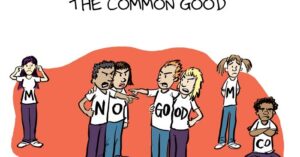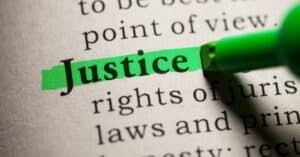
The term “social justice” is now commonly used by activists, clergy, educators, judges, corporate leaders, and politicians to describe the version of how society should work.
Originally a Catholic term, “social justice” was first used about 1840 in Theoretical Treatise on Natural Law by Luigi Taparelli, an Italian Jesuit priest. Taparelli’s version of social justice was simply an application of justice to social affairs and held that people should do what’s right based on a conceptualization of morality based on natural theology and religion. Since then, its religious concept has been taken over by secular “progressive” thinkers to mean uniform state distribution of society’s advantages and disadvantages.
If I were to ask you to define Social Justice, could you? In my readings of “progressive” proponents of the term, no precise definition of “social justice” is ever offered. Instead, the term is always used vaguely — as if everyone already knows, or should know, what the seemingly well-intentioned phrase “social justice” means.
So, what exactly is “social justice”? These are five common ways the term is used:
Distribution – For many, “social justice” implies the distribution of societal advantages and disadvantages. In this sense, the use of “distribution” suggests that some extra-human force – most times, the state – does the distribution. “Social justice” has been used to mean the remedy to the exploitation of workers by a capitalist system. Those who promote this definition of “social justice” are often influenced by Marxism or Socialism. This ideological view of “social justice” sees man not as an individual, but as a part of a class. Thus, the word “social” (in “social justice”) refers to classes in a society.
“Justice,” in the Marxist context, means economic equality. This is the Marxist utopian ideal that all members of a society should receive the same amount of compensation, regardless of occupation, skill, or work ethic.
Social justice in a capitalist society, according to this ideology, can only be accomplished by wealth redistribution. This is done by seizing the wealth of the rich and giving it to the poor, using the government as the agent of redistribution.
John Paul II taught in Centesimus Annus – his encyclical simultaneously celebrating the fall of Communism and the hundredth anniversary of Leo XIII’s Rerum Novarum – that the failures of the bureaucratic welfare state stemmed from disrespect for the principle of subsidiarity, which led to “a loss of human energies and an inordinate increase of public agencies.”
He emphasized that, in the Catholic approach, poor relief must not only relieve material deprivations but contribute to the cultivation of virtues, which in turn bolsters human dignity among the poor themselves.
Many of the modern Catholic “Social Justice” movements are devoid of this Catholic approach and willing participants of using the state to transfer wealth from one group to another. Rerum Novarum that little good comes from redistribution. As practiced in modern western countries, income redistribution violates the principle of subsidiarity, which calls for social ills should be addressed locally wherever, and whenever possible.
Diversity, Equity, and Inclusion (DEI) – The American Sociological Review defines the term this way: Social justice requires resource equity, fairness, and respect for diversity, as well as the eradication of existing forms of social oppression. Social justice entails a “redistribution” of resources from those who have “unjustly” gained them to those who justly deserve them, and it also means creating and “ensuring” the processes of truly democratic participation in decision-making. It seems clear that only a “decisive” redistribution of resources and decision-making power can “ensure” social justice and authentic democracy.
For those who adhere to this definition “social justice” means influencing all institutions (educational, corporate, healthcare, media) to correct what they see as disadvantaged (e.g., racial minorities.) They may use terms like “access”, and “BIPOC”, among others, and are likely to subscribe to Critical Race Theory.
Usually, their prescribed solutions lead to more division and societal disruptions. I do not understand, for instance, why these calls for “social justice” exclude poor people that are not BIPOC. They also exist and supposedly need “social justice”? Does it not strike you that the goal of these DEI activists is other than helping the poor?
Common Good – Social justice is typically associated with some notion of the common good. Most people speak of “common good” when they mean something noble and shiny and good, something motherly. But who decides what the common good is, and who enforces the common good? The government? Even there, there is no one clear person to be held responsible and accountable for these decisions. Quickly, the beautiful notion of the common good gets ensnared in red tape. You have witnessed this with the COVID pandemic, in which the common good became an excuse for enhanced state control.
These are fundamental questions that are unanswered by “social justice” activists.
The Progressive Agenda – The progressive agenda was initially started to support workers to right the injustices labor suffered in a capitalistic society; it has now expanded to include their definition of social justice. One of these recent definitions is this:
The privileged in this world, for the most part, have unfettered access to reproductive health and education services to decide for themselves when and whether to bear or raise a child. The poor and disadvantaged do not. Thus, the struggle for reproductive justice is inextricably bound up with the effort to secure a more just society.
Accordingly, those who would labor to achieve economic and social justice are called upon to join in the effort to achieve reproductive justice and, thereby, help realize the sacred vision of a truly just society for all.
Access to birth control is not limited; the statement is implying access to abortion. The Progressive agenda has now added abortion under the rubric of social justice. The situation is the same in the case of gay and transgender rights.
Compassion – In addition to “equity”, the “common good”, “diversity”, and “inclusion” another term that is often used in association with social justice is “compassion.” Every “progressive” activist is fighting in the name of the poor. History, however, would tell you that more sins have been committed in the name of compassion in the last 150 years– by the Nazis, by the Communists, and by the African and Asian despots who have justified their regimes to help the poor than by any other force in history.
Just look at the lesson of Venezuela: it went from being the richest country in Latin America in the 1990s to being taken over by a Socialist (Hugo Chavez) who promised to bring “social justice” to the country. What happened to this realignment of society in the last two decades? Venezuela, according to the United Nations, now has 98% of its 28.8 million people living in poverty, and all the maladies like lack of health care, starvation, lack of schooling, and many others have reappeared.
Another example closer to home is the “War on Poverty,” which began in 1964. It was implemented in the name of compassion for the poor. Look at what it did. It destroyed families: Almost half of the pregnancies in Washington D.C. end in abortion; 70 percent are born outside of wedlock. It’s the largest-scale abandonment of women by men in human history, and it is happening all through the country. It has deprived many of their dignity and built obstacles to leaving such a life.
Thomas Jefferson wrote:
The most sacred of the duties of government is to do equal and impartial justice to all its citizens.” The hallowed duty to fulfill the promise of justice for all remains, or ideally should remain, as the guiding ideal for the people we elect to government.
How is, then, social justice different from justice?
Somebody gave this example: power lines installed near poor neighborhoods instead of wealthier neighborhoods are a prime example of social injustice. But when is a justice issue not a “social” justice issue? In other words, “social justice” is just an attempt by some group at righting what they consider to be wrong. That explains why there are many definitions of “social justice” and an ever increase of “rights” included in them.
Where does justice lie? Sometimes even a pure motive does not a just action make. Human affairs are a muddle; good and bad motives are tangled up in the human heart more often than we realize.
Even in situations where your motive is good, the end you seek is good, and the means to achieve it is not illegal, you may still be acting unjustly, or at least imprudently, and sometimes with disastrous consequences that you might have foreseen had you not been so blinded with your dream of justice—and had you troubled to listen fairly to those who opposed you.
Where should Catholics stand on the issue?
Serving the poor is part of our rich Catholic heritage. It’s also rooted in natural law, and it. Unfortunately, our nation is going through a crisis of faith with an unprecedented acceptance of systematic atheism and secularism. Pope John Paul II warned us in Evangelium Vitae 23 that our society’s loss of the sense of God and of man will inevitably lead to practical materialism, and breed individualism, utilitarianism, and hedonism.
Some of the Catholic Church’s social outreach programs have been corrupted by such secularist and materialistic models, turning social justice into shortsighted political activism in which the quest for human development has been co-opted by agendas that are completely opposed to Church teaching and the good of the human person. It is no longer unusual to encounter “social justice” Catholics openly dissenting from Church teaching.
Progressive political activists understand that compassionate-sounding Catholic language can be used to generate support among Catholics, but they are using the term to serve their purpose. Do not let them fool you.
